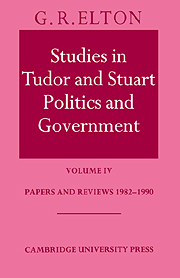Book contents
- Frontmatter
- Contents
- Preface
- Acknowledgments
- Abbreviations
- I POLITICS AND THE REFORMATION
- 49 The State: Government and Politics under Elizabeth and James
- 50 Lex Terrae Victrix: the Triumph of Parliamentary Law in the Sixteenth Century
- 51 Human Rights and the Liberties of Englishmen
- 52 King Henry VII
- 53 Wales in Parliament, 1542–1581
- 54 Piscatorial Politics in the Early Parliaments of Elizabeth I
- 55 English National Self-consciousness and the Parliament in the Sixteenth Century
- 56 Thomas More and Thomas Cromwell
- 57 Lancelot Andrewes
- 58 Persecution and Toleration in the English Reformation
- 59 Auseinandersetzung und Zusammenarbeit zwischen Renaissance und Reformation in England
- 60 Humanism in England
- 61 Luther in England
- 62 Die europäische Reformation: Mit oder ohne Luther?
- II ON HISTORIANS
- Index of Authors Cited
- General Index
58 - Persecution and Toleration in the English Reformation
Published online by Cambridge University Press: 03 February 2010
- Frontmatter
- Contents
- Preface
- Acknowledgments
- Abbreviations
- I POLITICS AND THE REFORMATION
- 49 The State: Government and Politics under Elizabeth and James
- 50 Lex Terrae Victrix: the Triumph of Parliamentary Law in the Sixteenth Century
- 51 Human Rights and the Liberties of Englishmen
- 52 King Henry VII
- 53 Wales in Parliament, 1542–1581
- 54 Piscatorial Politics in the Early Parliaments of Elizabeth I
- 55 English National Self-consciousness and the Parliament in the Sixteenth Century
- 56 Thomas More and Thomas Cromwell
- 57 Lancelot Andrewes
- 58 Persecution and Toleration in the English Reformation
- 59 Auseinandersetzung und Zusammenarbeit zwischen Renaissance und Reformation in England
- 60 Humanism in England
- 61 Luther in England
- 62 Die europäische Reformation: Mit oder ohne Luther?
- II ON HISTORIANS
- Index of Authors Cited
- General Index
Summary
The century of the Reformation, in England as elsewhere, sharpened all conflicts and augmented persecution. As the unity of Christendom broke up, the rival parties acquired that sort of confidence in their own righteousness that encourages men to put one another to death for conscience sake; an era of moderation and tolerance gave way to one of ever more savage repression. To the openminded willingness which characterised the humanism of Erasmus and More as well as the Rome of Leo X there succeeded the bigotry typical of Carafa, Calvin, Knox and the English Puritans; only the gradual evaporation of such passions, produced by each side's inability to triumph totally, produced a weariness with religious strife which made the return of mutual sufferance possible. That, at least, is the received story. Historians of toleration, as for instance Jordan and Lecler, firmly described the history of persecution in this way. Jordan identified six developments which led to its decline in sixteenth-century England: a growing political strength among dissident sects, the impossibility of preventing splintering and preserving uniformity, the needs of trade which overrode religious hostility, experience of travel, the failure to suppress dissident publications, and finally a growing scepticism which denied the claims to exclusive truth advanced by this or that faction. In other words, only two things moved men, once they had fallen away from the generosity of the pre-Reformation era, to substitute an uneasy toleration for a vigorous persecution: the external pressures of experience and the decline of religious fervour.
- Type
- Chapter
- Information
- Studies in Tudor and Stuart Politics and Government , pp. 175 - 198Publisher: Cambridge University PressPrint publication year: 1992



